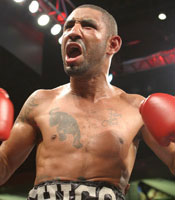

I never met Diego “Chico” Corrales. I saw many of his fights, but never actually got the opportunity to meet him. However, I was fortunate to have been able to talk to him on the phone once, and for me, that’s good enough.
I was understandably nervous when I first began speaking with him two weeks after his first fight with Jose Luis Castillo. I had just started covering boxing, and here I was having a phone conversation with the man who had just staged one of the greatest comebacks in the history of the sport.
Corrales could sense my nervousness. But with a warm laugh and a few jokes, he quickly made me feel as though we were old friends who had grown up together.
From what I hear, Corrales always made people feel this way. With his glowing eyes and captivating smile, he made everyone seem important. He was never one for arrogance or childishness—not at press conferences, not in the ring.
Corrales will not be remembered as the most talented fighter of this generation. He didn’t possess the fluidity of a Floyd Mayweather Jr. or the ring generalship of a Bernard Hopkins. He didn’t have the blazing speed of a Shane Mosley. Nor did he have the impenetrable defense of a Winky Wright.
But he had the heart of a lion.
And with it, he did more than become a two-division champion.
With it, he helped give life to a sport most Americans no longer care for.
Whenever Corrales laced up a pair of gloves, it didn’t matter if you were rooting for him or not, he made you watch. He made you think you could get up after five knockdowns, too. He made you feel boxing was as important as it had ever been. He made you believe pain was beautiful, glorious, and worthwhile.
My grandfather has always told me about the golden age of boxing and how the sport today is an insult to what it used to be.
According to him, fighters nowadays are soft, greedy, and lazy. He finds it cowardly that boxers squabble over things such as whether or not their opponent is wearing a different pair of gloves. He thinks it’s ridiculous that fighters price themselves out of bouts. He believes it’s absurd that boxers only fight twice a year.
He always tells me I would’ve been happier growing up in the 40s and 50s, back when boxing still mattered. Back when there were still men who lay their lives on the line for a win on their professional record.
That’s where he’s wrong.
I may have never heard a Stanley Ketchel or Jake LaMotta fight on the radio.
I might not have been around to watch an Archie Moore fight. But I, we, had Diego Corrales.
Corrales may have served time in prison. He may have done a thousand things wrong in his life, I don’t care. He was our warrior. He always gave us everything and more when it came to boxing. And for those twenty or so minutes that he and I talked on the phone, he gave me a memory that’ll last a lifetime.
Thank you, Chico. We love you. We’ll never forget you.
 I never met Diego “Chico” Corrales. I saw many of his fights, but never actually got the opportunity to meet him. However, I was fortunate to have been able to talk to him on the phone once, and for me, that’s good enough.
I never met Diego “Chico” Corrales. I saw many of his fights, but never actually got the opportunity to meet him. However, I was fortunate to have been able to talk to him on the phone once, and for me, that’s good enough.